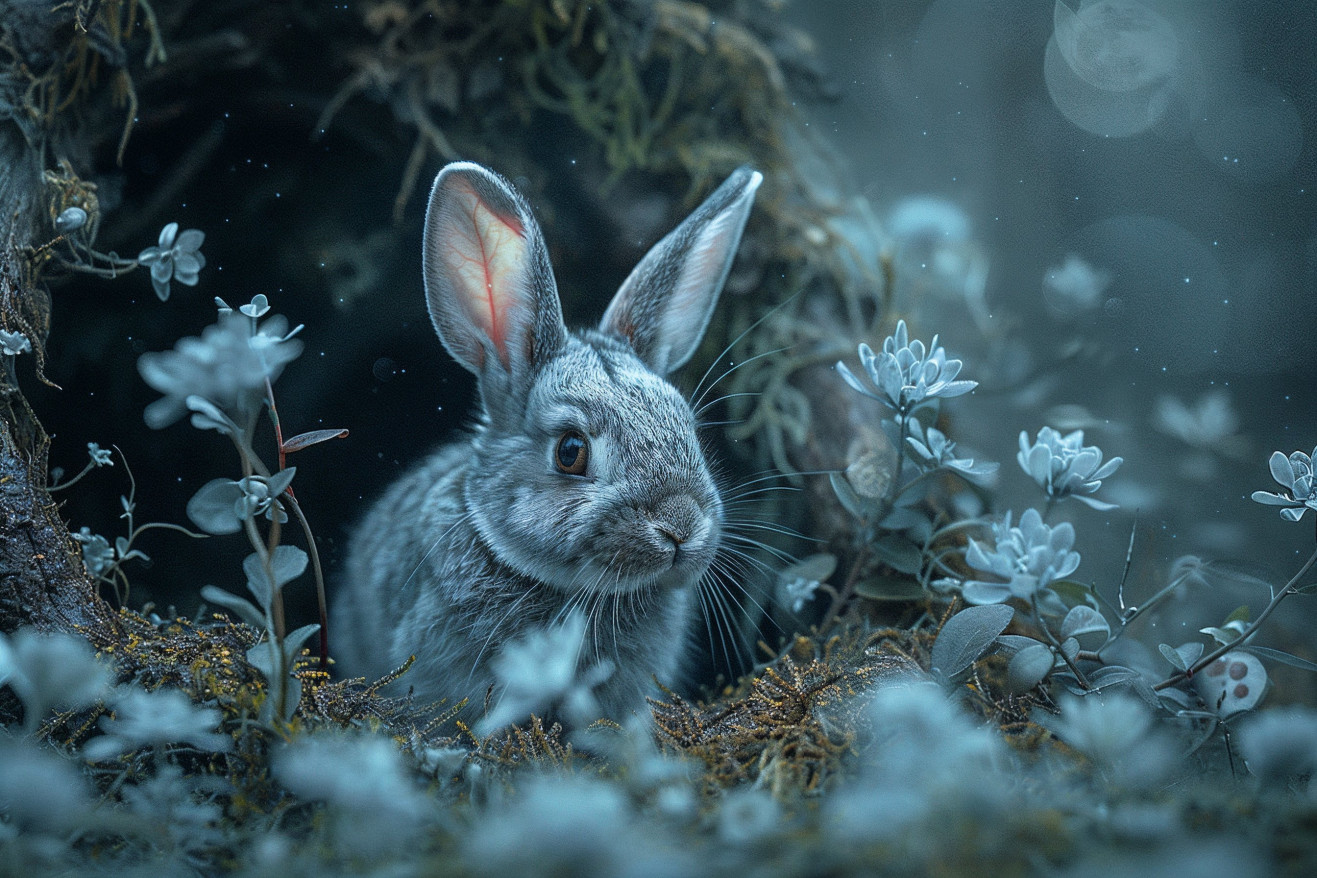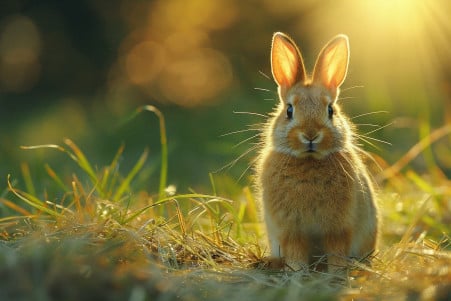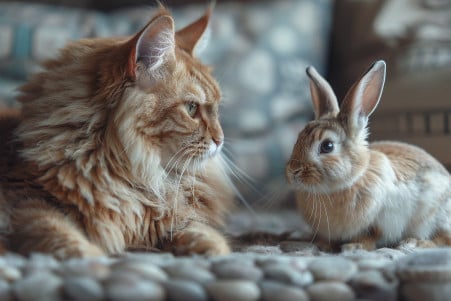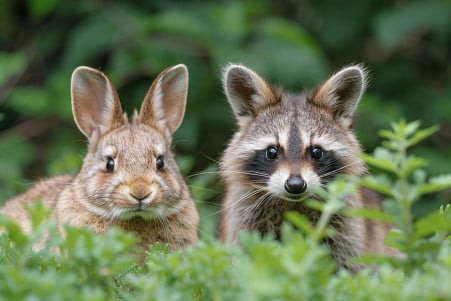Rabbit Nighttime Dangers: What Can Kill Your Bunny at Night?
19 April 2024 • Updated 17 April 2024

For rabbit owners, the sounds of the night can be downright scary, and it's natural to wonder what dangers your pet may face after dark. Unfortunately, rabbits can be hunted by predators like foxes, coyotes, and even domestic dogs and cats if they are kept outside at night. This is why it's important to make sure your rabbits are kept in a secure hutch and are supervised when they're outside, as rabbits are prey animals and are at risk of being attacked by predators.
In addition to the risk of predators, there are other, less well-known dangers that rabbits face at night. This article will look at the scientific research on some of the most common nighttime dangers, including digestive issues, temperature changes, and other dangers that have led researchers to recommend certain precautions. Knowing what these dangers are can help rabbit owners ensure they're doing everything they can to protect their pets at all hours of the day and night.
What can kill rabbits at night?
Common Deadly Diseases and Health Risks for Rabbits at Night
Rabbits are at risk for a number of deadly diseases and health risks at night that rabbit owners should know about. They are especially prone to digestive diseases like enterotoxemia and coccidiosis, both of which can be fatal if rabbits don't receive treatment, notes the Merck Veterinary Manual. Rabbits are also at risk for respiratory diseases like pasteurellosis, which is highly contagious and can spread quickly among rabbit colonies.
Skin diseases are another concern, with ear mites, fur mites, and fleas being common issues. Even urinary tract diseases like kidney or bladder stones can be life-threatening for rabbits if they aren't treated. A study published in PMC explains that rabbits have several biological factors, including a low metabolic rate, that make them more susceptible to certain diseases.
It's important to make sure that rabbits have safe housing, proper nutrition, and access to medical care to help prevent and treat these nighttime health risks before they become deadly. As prey animals, rabbits in both the wild and domestic environments need to be carefully looked after to make sure that they don't succumb to the many diseases that can be fatal during the night. Their ability to survive depends on a combination of defense mechanisms and biological traits.
How Rabbits Survive: Avoiding Nocturnal Predators
Rabbits have developed a number of clever ways to avoid their many predators, especially those that are active at night. According to a study on rabbit defense mechanisms, the most important way rabbits protect themselves is by running and hiding. Rabbits have great senses, including nearly 360-degree vision and the ability to rotate their ears 270 degrees to better hear sounds. This means they can detect danger early and act accordingly.
If they are caught, rabbits can use their strong back legs to kick and their sharp teeth and claws to defend themselves, as explained in an article on rabbit behaviors. However, their first instinct is to escape, and they can run as fast as 30 miles per hour to get away from predators. Rabbits can also "freeze" and "play dead" to avoid being found.
Rabbits' crepuscular behavior, which means they are most active at dawn and dusk, helps them avoid predators like owls and hawks that are active at other times of the day. Studies have found that young rabbits have even better acceleration and power, which makes them even better at escaping predators. By using a combination of anti-predator behaviors like hiding and changing their behavior, rabbits are able to better survive the many predators that are most active at night.
The Impact of Urbanization on Rabbit Survival
One of the main reasons that rabbit populations are declining is due to habitat loss and urbanization, which is explored in a paper on the impact of population declines on rabbits and hares in Doñana National Park, Spain. As rabbit populations fall, so do the populations of their predators, such as the Iberian lynx, which are specialized to hunt rabbits, and this increases the risk of their extinction.
Rabbits in urban environments like Chicago are threatened by a number of factors including predation by coyotes and other animals and disease, such as Tularemia, according to WBEZ. While the urban "heat island" effect can help rabbits by making the environment warmer, they still struggle to survive the cold winters.
Changes in agricultural land use have also contributed to the decline of wild rabbit populations, as studies have found that rabbit abundance is positively associated with natural vegetation and the proximity of crop fields. It will be important to protect their habitats and manage urban rabbit populations to ensure their survival, especially at night.
How to Keep Pet Rabbits Safe at Night
Keeping pet rabbits safe at night involves a number of different strategies. The most important is to make sure that they have secure, predator-proof housing, especially at night when rabbits are most at risk. As noted in the Scottish government's pet rabbit welfare guidance, rabbits are prey animals that will run away from danger, so their environment must be secure.
Supervision is also important, as rabbits should never be left alone, even in a secure outdoor environment, because, as studies have shown, they can still be attacked by predators. And of course, proper nutrition, housing, and medical care are important for preventing the health problems that can lead to a rabbit's death, as described in VCA Animal Hospitals' guide.
Knowing what predators are in your area and taking the necessary steps to protect your rabbits is also important. In some cases, this may mean keeping rabbits inside or in a secure environment at night to protect them from the many threats that come out after dark. By making sure that we're keeping our rabbits safe, we can help ensure that they make it through the night.
Conclusion: Protecting Rabbits During the Night
Rabbits are at risk from a variety of threats during the night, including predators, health problems, and other environmental concerns. It is important for both rabbit owners and conservationists to be aware of these risks and take steps to protect rabbits. This includes making sure that rabbits have safe housing, are supervised during outdoor time, and receive proper care.
Other important issues to consider include protecting natural habitats and dealing with urban rabbit populations. However, by working to overcome these issues, we can help make sure that rabbits are safe and healthy in both the wild and in human care.


